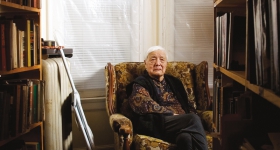“Everything is free?” the woman asks in Cantonese, eyeing the flyer. “But I don’t have insurance.” Her husband, assuming we are trying to sell something, urges her to keep walking. It’s busy on the sidewalk in Oakland, Chinatown, and they have groceries to buy. But instead, she moves toward the doors of Asian Health Services to get in line.
Preventive care is critical to community health, so we work to reach communities before hepatitis B does. Like HIV, hepatitis B travels through blood, breast milk and sexual fluids, but it is a hardier virus and, thus, more infectious. For many people, it is like a bad flu that lasts several weeks but leaves a person virus-free. For others, it causes a sudden liver failure, often leading to death. Another one in four never gets rid of the virus, which smolders until it leads to liver cirrhosis (the scarring — then failure — of the organ) and possible cancer. But unlike many other fatal diseases, there is a vaccine. The problem is getting access to it.
For three years, the Hep B Project has worked to provide education, screening and vaccinations across Alameda County. The disease unequally impacts the Asian American and Pacific Islander community: one in 10 will contract the disease, compared with one in 1,000 whites. With 400,000 APIs calling Alameda County home, we certainly have our work cut out.
The Hep B Project’s clinics started in the lobby of Oakland’s Street Level Health Clinic. We now have twice-weekly clinics there and at Asian Health Services, staffed by community health leaders and student volunteers like myself.
The couple who agreed to be tested were in their late 30s, both unemployed and uninsured; they would otherwise have no access to testing. After some routine tests, they also showed a high risk for diabetes. They had not seen a doctor since they were children in China.
This is not uncommon. Across the East Bay, we meet individuals who have enormous financial or language barriers to getting simple tests or learning more about their health, leading to devastating — and preventable — pain and suffering. Our project seeks to break through this. We try to be where the community is, in churches, temples, health fairs and community centers, providing services for free. In three years, we have provided over 1,000 screenings to patients all over the Bay Area.
The couple’s test results showed that they were both infected with the hepatitis B virus. I translated as a physician explained that the disease can exist without symptoms, but can rapidly progress to severe disease. We could not cure it, but we could help manage chronic hepatitis B, try to prevent worse outcomes and address their diabetes risk. We fast-tracked them to Asian Health Services. They were back in clinic next Saturday.
There is a parable in public health: People are drowning in a raging river, and medicine works to pull them out, one at a time. Many are saved, but many are lost. Public health ventures to stop people from falling in. The Hep B Project seeks to work in the community before anyone drowns at all.
Jason Cham is a clinic coordinator for the Hep B Project and a student at UC Berkeley.
To read more stories from The Generation Issue, subscribe to Hyphen or pick up a copy at a newsstand near you.









Comments